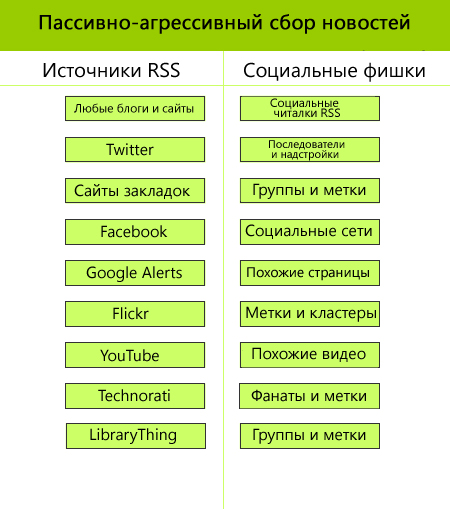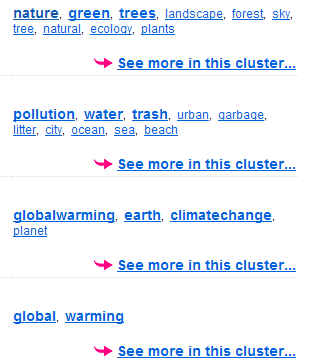Passive-aggressive news gathering
- Transfer
RSS + social media = “passive-aggressive news gathering”
It would seem that he has already completed his series of articles “21st Century Media” , but here came another idea for collecting news in an online environment (see “Distributed Journalism” ). I think that at the first stage, any journalist does two things - subscribes to reliable RSS feeds and mailing lists , and then studies the resources of various networks . The first method of collection is passive, the second is somewhat more active. So, with some irony, I called it "passive-aggressive news gathering."
As shown in the diagram, each RSS source has social features that you need to pay attention to and use.

Blog and Site Feeds / Social Readers RSS
Any journalist must know the sources of news - official websites and unofficial blogs - in the area in which he specializes. He must subscribe to their RSS using any of the available RSS readers . As a result, he must create a single center where all the news on his topic flocks. You might want to go further, arrange your feeds in folders, or separate them by frequency of checks. You will check something daily, something once a week, something even less often.
But some RSS readers provide something more. Google Reader , for example, having analyzed what you have already subscribed to, will itself offer you feeds that, in its opinion, correspond to your interests. Bloglinesallows you to click on your feed and see who else is following it. You can also see which feeds they have in turn subscribed to. (However, in their latest beta version of the service this function was not.)

Other readers have similar functions. If not, you should change the reader. (Transferring a list of your feeds is easy enough now.) Because this is a very good way to find new sources of news and information.
Twitter and add-ons
Twitter is a very fast news source that you can follow thanks to all the same RSS or via sms. Twitter is social in its essence - you follow other people's updates, someone follows yours. You see who is following whom. But there are also add-ons like Twubble , which will tell you who else to follow based on your friends list, and Twits Like Me , which will give you a list of tweets with similar interests. With their help, you can make useful contacts and find new sources of information that you were not aware of before.
Another good way to find the tweets you need, apart from actually searching on Twitter, this is to look for links to tweets on blogs that interest you, under thematic articles, etc. But you can also limit your search geographically using Twitterlocal . If you are interested in a separate topic, then set the search keywords using Tweetscan . If you know that there is some kind of event that will cause a protest (for example, the Olympic torch relay for games in China ), then it is better to search for these keywords in advance.
Bookmark Site Feeds, Groups, and Tags
Bookmark sites like Delicious , Digg, and Reddit (plus all of these ) are a real deposit of news and headlines. Not only can they be searched based on their database, but most of them offer feeds of other people's tags, feeds of individual users and feeds of user groups. A journalist should at least determine a list of keywords by topic and subscribe to the feed of search results for them (for example, the feed tag for “social bookmarking” ). Then you need to find those users who are interested in the same topic and subscribe to their feed (here is the feed of all my bookmarks ). Then look for groups with similar interests and subscribe to the feeds of their link collections (heremy collection ).
True, in order to get the maximum benefit, the journalist himself must be active. Whenever you post a bookmark, you see in whose other collections it is present (see the picture below), you see who posted it first. And that means you see the fastest source of news. In addition, you see a comment on it and the labels that they use to denote this topic, and what else they post. Now add this source to your group and stay tuned for new arrivals.

Such work will allow you to make useful contacts, expand the circle of newsmakers and better understand the scope of your professional interest.
Facebook Feeds / Social Networks
Journalism is based on connections. Whether it’s current acquaintances, acquaintances of acquaintances, or interest groups, social networks are a great way to expand and support them. You may want to participate in several networks at once. Facebook is good for everyone. LinkedIn is better for professional contacts. But you can find more specific ones, for example, for doctors . Did not find? Build your network! Using Ning .
On Facebook, feeds are very conveniently made, including updates to the status of friends and what they post . Subscribe to them!
Google Alerts / Related Pages
Google's success is that it is built on the principle of social media. Search results are calculated (in part) based on how many people link to a particular site. But pay attention to other chips. Each link in the search results has a link “Similar pages”. This is a great way to improve your searches. In addition, in the " advanced search " it is possible to determine which sites link to the page you are interested in.
Moreover, it has now become universal journalism to subscribe to email alerts. Go to Google Alerts. By default, the "Type" field indicates "Comprehensive" (that is, everything that falls into the field of view of Google). But you'd better install there “News”, “Groups” (discussion groups, e-mail conferences), or “Blogs” (blogs). All new items will be sent to your e-mail.
Alternatively, you can go to Google News or Google Blog Search sites , search for something there and subscribe to the feed with search results.
Flickr Feeds, Tags, and Clusters
If you need photos or need to chat with photographers, you can subscribe to individual feeds or tags on the Flickr website (see, there are links at the bottom of each page).
However, the charm of the site lies in its social features. Use the search on the site, and you will get a simple set of links, but click on any label in the search results - you will get a set of clusters in which this label is present.

The content of these clusters is based on the behavior of other users and helps to filter out inappropriate photos, in addition, they will tell you what else might interest you. You can see the search results by label, go to the proposed clusters, change the label directly from the cluster. And there, sort the photo by the time it was added or (again, a social feature) by interest.
Of course, you can see the cloud of the most popular tags at the moment . A good way to think about the spirit of the times.
If you are more interested in people, not pictures, you can open any profile, there will be shown contact information and the groups in which this photographer is a member. You can also filter people based on their interests and biographical data. You can also usedirect search by groups and people .
YouTube Feeds / Related Videos
YouTube is the same social beast as Flickr. Click on any video and you will be given a list of similar ones. You click on the page of any user and see what he is subscribed to. You can sort the search results by ratings or by number of views. And you can view the content by clicking on the tags. In addition, on the site under the link " Community " access to user groups is covered .
A list of site feeds, as well as instructions on how to create a feed from individual users and tags, can be found here .
Technorati feeds, fans, and tags
Red RSS icons flash across the entire Technorati site . You can subscribe to headlines, “growing posts and stories”, filter them by “attention”. You can subscribe to the feed with search results for any query, tag. You can even subscribe to how blogs react to a particular site.
No less impressive are the social features of this site. The search results will recommend tags that you might be interested in. Blogs and posts are sorted by authority (number of reactions). You can see who called himself a fan of which blog, and delve into the list of blogs that they added to their bookmarks.
And like Flickr, you can find out what has leaked to blogs right now .
LibraryThing feeds and tags
Finally, you need to mention the social features and feeds of the LibraryThing book community . Here you can search by author, title, tags, members, groups and forums. All search results have their own feed. As well as every member of society, group or label.
It is not surprising that for any search the site will offer its own tags and links to the profiles of other users, and the groups will show leaders and participants.
CoComment feeds, groups, and tags
coComment is a service that monitors your comments. Those interested can contact you directly, or subscribe to the feed with all your comments that you leave on other sites. The benefits to journalists are obvious. If you find a person on the topic you need, it will be easy for you to track what he writes. At the same time, he will throw news.
If he is registered with coComment, you can subscribe to his personal feed. If you do not use it, then you have to write him a flattering letter with a proposal to register.
In addition to feeds, there are other social features here - scroll through the tags , look at popular discussions , join groups , view commentator profiles .
Perhaps some journalists will be frightened by a certain dominance of technological topics on the site, but the sooner you start using the service, the faster people with the interests you need will appear there.
All that I wrote here, no doubt, does not save the journalist from work. It just helps him keep his eyes open, saving time through RSS, facilitating new acquaintances, generating intuitive insight through social media.
Without a doubt, I have described far from all services with social chips for working with RSS. In particular, I guess that somewhere there should be a social service for podcasts. And of course, I did not delve into the special subtleties of working with the sites that were discussed. If you have something to share, write.
Paul Bradshaw ( Paul Bradshaw )
April 21, 2008.
From a translator: The
article was translated with the personal permission of the author. At his request, I indicate the address of the article directly in the text:
http://onlinejournalismblog.com/2008/04/21/rss-social-media-passive-aggressive-newsgathering-a-model-for-the-21st-century-newsroom- part-2-addendum /
I hope the Habr administration will take into account the author’s request and forgive me for the forced violation of the format.
